How can collaboration between governments, financial institutions, and the private sector be optimized to unlock the full potential of digital finance and credit for achieving financial inclusion?
Tanzania’s payment industry is flourishing making the need for industry partners to work together is inevitable. There are a number of potential benefits offered by interoperability of financial services including ease of payment, fast, cost effective and secure means of payments. Tanzania Instant Payments System (TIPS) is an interoperable digital payment platform operated by the Bank of Tanzania, which allows the transfer of payments between different Digital Financial Service Providers (DFSPs), both banks and non-banks such as e-money issuers. TIPS handle real-time payments exchanged among participating Digital Financial Service Providers (DFSPs). TIPS has increased financial inclusion by improving access and usage of financial services in Tanzania through promoting the interoperability of digital financial services amongst all Payment Service Providers in the country. The TIPS platform facilitates an efficient clearing and settlement platform of digital financial services transactions for all Payment Service Providers (PSPs).
Digital Financial Service Providers (DFSPs) are offering numerous payment solutions (Bill Payments, P2P, P2G, P2B, etc.), borrowing solutions (Nano Loans) and protection solutions (Micro Insurance).
What regulatory measures can policymakers implement to create an enabling environment that fosters innovation and competition in the realm of digital finance?
The Bank of Tanzania as a regulator is a key stakeholder in this aspect. The Bank of Tanzania in this regard gives advice and setting policies to ensure smooth, safe and secure operations among parties involved. Regulators not only set an enabling environment but also plays the role of a watchdog to ensure safety and security of operations. Regulators also play a key role in ensuring commercial viability is balanced against the affordability of these services.
In your opinion, how are traditional banks responding to the emergence of neobanks in Africa, and what does this mean for the future of banking in the region?
Traditional Banks in Africa are now well aware of the industry disruptors like neobanks, digital finance service providers, payment service providers etc.
Banks are keeping abreast with technology and evolving customers needs. It is for this reason that banks are regaining their lost ground against the digital disruptors. It is true that all traditional banks are not at the same level of maturity but few leading banks in each market are operating in a collaborative manner with emerging fintech’s and established MNO’s.
How does leveraging data contribute to providing better services for the unbanked and underbanked?
Data Analytics and Customer Analytics is a must for succeeding in the digital era. The sheer number of customers and volume of business in digital space makes the traditional decision-making process redundant. A lot of information is available on a real time basis enabling the leading digital led business to analyze the customer credibility and business viability in seconds and providing customer solutions instant.
How would you think attendees will benefit by attending the 14th Africa Bank 4.0 Summit – Pan Africa?
In this fast-changing world, it is important for all to seek knowledge using all information sources. A lot of information is available on-line but robust learning still requires human interaction. This summit will provide an opportunity to meet and discuss ideas with like minded people. While customer needs are unique there is always common overlapping needs that can be solutioned if customers need, customer decision making process and customer journey is well understood. I have always found this summit to be a space where all key stake holders including technology solution providers converge to find customer friendly solutions.



